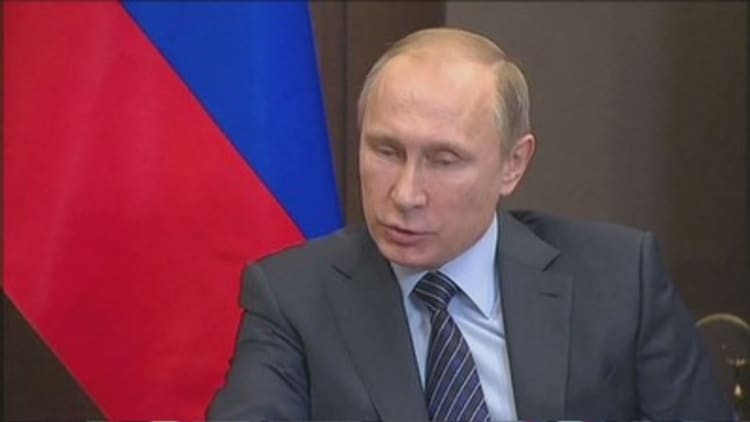
Relations between Russian President Vladimir Putin and his Turkish counterpart hit a new low Monday after Putin accused Turkey of shooting down one of its warplanes last week in order to protect the transit of oil sold by Islamic State through Turkey.
On Monday, Putin said Russia had proof that the SU-24 warplane downed last week by the Turkish military on the border with Syria, was done to aid the transit of that oil.
"We have just received additional information proving that unfortunately, large volumes of oil, industrial volumes coming from oil fields controlled by ISIS and other terrorist organizations, enter Turkey's territory," he said, according to a transcript of his speech on the Kremlin's website.
"And we have every reason to believe that the decision to shoot down our plane was dictated by the desire to ensure the security of these oil supply routes to Turkey – to the ports where it is shipped out in tankers – while protecting the Turkmen is merely a pretext."
Speaking in Paris on Monday, President Recep Tayyip Erdogan said he would resign if there is proof of Turkey's cooperation with Islamic State, the terror group which operates in swathes of Syria and Iraq.
"We are not that dishonest as to buy oil from terrorists. If it is proven that we have, in fact, done so, I will leave office. If there is any evidence, let them present it, we'll consider [it]," he said, as quoted by the Russian TASS news agency.
Putin is also reported to have snubbed an offer of face-to-face talks with Erdogan on Monday in Paris, where both leaders are attending the United Nations summit on climate change. "No meeting with Erdogan is planned. There is no discussion of such a meeting," Kremlin spokesman Dmitry Peskov told journalists, according to the AFP.
Damning evidence?
If Russia can prove Turkey's involvement with ISIS it would be damning for the country that has seen a rapprochement with the West following its decision to join a coalition fighting ISIS.
The country is part of a Western alliance conducting airstrikes against the group and, in addition, Turkey has also just signed a deal with the European Union in which it has promised to help stem the influx of migrants to Europe (who are fleeing civil war in Syria and Iraq) in return for aid, visa-free travel to Europe and renewed talks on joining the 28-country union.
Islamic State is able to fund itself through a variety of means but one of the most crucial sources of income is oil. By taking control of oil fields in Syria and Iraq and selling oil on the black market it has been able to amass large revenues which enable it to expand further, according to analysts.
Analysts have also noted that ISIS' oil could be being sold to Turkey and the Syrian regime but there has been little evidence for this, making Russia's allegation the most serious in a string of accusations in the last week since the downing of the Russian warplane, in which one of the pilots died.
Russia and Turkey's once-warm relationship was immediately damaged by the incident and a war of words continued throughout the week. Turkey refused to apologize and said the plane was in its airspace, a charge Russia denied.
Read MoreRussia turns on Turkey in retaliation for downed jet
Although both countries have long been allies and trade partners, Russia has retaliated by imposing sanctions on Turkish imports, an end to visa-free travel and said other strategic trade and investment deals with Turkey were at risk.
Lilit Gevorgyan, senior economist at IHS Global Insight said in a note Monday that "the current confrontation is a major setback for more than a decade long efforts to build commercial and energy partnership between Russia and Turkey, despite diverging political goals."
- By CNBC's Holly Ellyatt, follow her on Twitter @HollyEllyatt. Follow us on Twitter: @CNBCWorld




